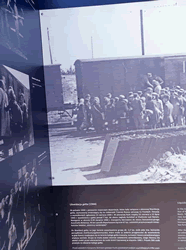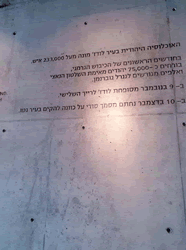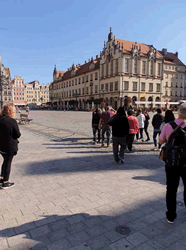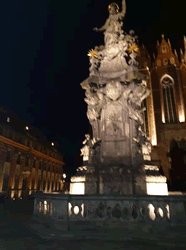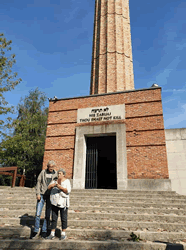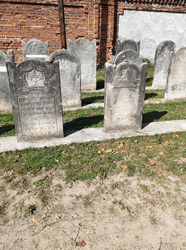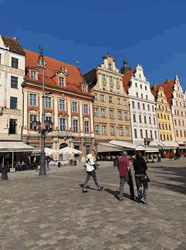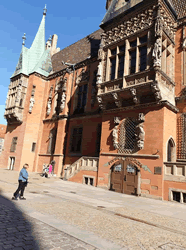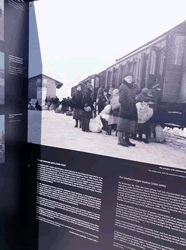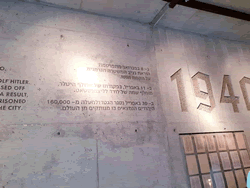Jacky Harmach visits to Poland, The birthplace of his holocaust survivors parents
My name is YACOB ELKANA HARMACH
I am the son of two Holocaust survivors. Both of them lost their families during the Holocaust
My father is the only survivor of his family. They lived in the town of DZIALOSZYCA, about 60 kilometers from the city of Krakow in Poland.
In September 1942, SS men surrounded the town and took thousands of Jews to the main square. My father and his brother, Chaim, managed to escape to the forest and were rescued but were trapped in the woods after a while. Chaim perished
My mother was born in the city of Lodz and was married and had a family. She was in the Lodz ghetto and in a labor camp until the end of the war. She lost her family in the Holocaust except for one surviving brother and one sister.
After the war, the Jewish survivors were gathered in a camp in the city of Brussels, Belgium, where my mother and father met, got married and immigrated to Israel.
My mother gave me birth in 1950 at the age of 41 in Israel. It was not easy to grow up in a family that went through the Holocaust under such catastrophic conditions.
It was difficult for them to adapt to the new language and to acclimate in a country that was just established. They avoided talking about what they had been through during the Holocaust.
Of course I was an only child because of these circumstances
I tried to ask them about the past but had little success.
In 2011, I received information about my father's family who perished in September 1942 Eilat Gordin Levitan, a sister of my good childhood friend
To this day, I thank her for connecting me to my father's past
Eilat thanks a lot
I wanted to look for some sign or testimony for my grandfather's family who perished but couldn't visit Poland until this month and last week I returned from Poland after finding in my grandfather Annetta's town a mass grave of about 2000 people and whose grandfather (Elkana) I was named after.
After the death of my parents, 14 years ago, I arranged for my son's wedding party. When the hall owner asked how many guests we would have, I answered 450 people. He asked that each of the parents and the couple give the number of friends and how many relatives he invited. I answered I have about 80 friends to welcome, and the relatives from my side can get on a motorcycle and do not need the back seat, which means there was not a single person with blood connection to me who lived in Israel.
My grandfather; Elkana Kharmatz was married to Khava. Prior to WWII
he lived in Dzialoszyce, Poland. Elkana perished in the Shoah. This
information is based on a List of victims from Yizkor books found in
the YIZKOR BOOK OF THE JEWISH COMMUNITY IN DZIALOSZYCE AND
SURROUNDINGS (HEB, YID, ENG), TEL AVIV, 1973 page 404.
My grandmother: Khava Kharmatz was married to Elkana. Prior to WWII
she lived in Dzialoszyce, Poland. Khava perished in the Shoah. This
information is based on a List of victims from Yizkor books found in
the YIZKOR BOOK OF THE JEWISH COMMUNITY IN DZIALOSZYCE AND
SURROUNDINGS (HEB, YID, ENG), TEL AVIV, 1973 page 404.
My uncle: Khaim Kharmatz was born to Elkana and Khava. Prior to WWII
he lived in Dzialoszyce, Poland. Khaim perished in the Shoah. This
information is based on a List of victims from Yizkor books found in
the YIZKOR BOOK OF THE JEWISH COMMUNITY IN DZIALOSZYCE AND
SURROUNDINGS (HEB, YID, ENG), TEL AVIV, 1973 page 404.
My aunt: Chana Kharmatz was born to Elkana and Khava. Prior to WWII
she lived in Dzialoszyce, Poland. Chana perished in the Shoah. This
information is based on a List of victims from Yizkor books found in
the YIZKOR BOOK OF THE JEWISH COMMUNITY IN DZIALOSZYCE AND
SURROUNDINGS (HEB, YID, ENG), TEL AVIV, 1973 page 404.
https://www.facebook.com/jacky.harmach/videos/10157547072443887/?t=7-
another aunt; Esther Kharmatz was born to Elkana and Khava. Prior to
WWII she lived in Dzialoszyce, Poland. Esther perished in the Shoah.
This information is based on a List of Victims from Yizkor books found
in the YIZKOR BOOK OF THE JEWISH COMMUNITY IN DZIALOSZYCE AND
SURROUNDINGS (HEB, YID, ENG), TEL AVIV, 1973 page 404
The translation of some of the Yizkor book online (click or paste):
http://www.jewishgen.org/yizkor/Dzialoszyce/Dzialoszyce.html
a person from the town was; Dr. Moshe Bejski, whose life was saved by
Oskar Shindler. He became a prominent citizen in Israel after the war. He
was a Supreme Court justice and also chairman (1970–95) of the
Commission of the Righteous, established by Yad Vashem
About the town which is very near Krakow: Many generations ago, when
the great territories of Poland were under the power of the first
Polish monarchs, dense forests covered the land and were full of all
types of animals or prey. In those days, when it was in the area
which is the Dzia?oszyce of today is located,
the land was all covered with trees and forest. In the thicket of
these dense forests, prominent knights and, frequently, his highness
the king himself and his entourage would organize hunts of wildlife
animals. As was the tradition in those places designated for the hunt,
the knights would station many of the soldiers, whose role was to
locate the resting place of the animals, in shacks with raw wood
roofs. For the most part, these settlement places were located along
the edges of a small creek and served the hunter-knights as places to
remainder. A comfortable place to rest was the plain that spread between
two small creeks, who joined together when they reached the plateau
covered with meadows and poured into a larger river, the Nidzica
River.
Upon the banks of these small rivers, about 900 years ago, the owner
of the lands and estates of those days established a forest guard
mail. As the years passed, these first settlers flourished, building
huts and creating a permanent settlement that they named Zalesice,
that is, "on the edge of the forest."
Because Zalesice lay next to the king's main road,
which led from
Kraków through Proszowice and Skalbmierz to the town called Wi?lica,
the settlers grew in numbers there. And already in the 12th century,
the temporary settlement turned into a large village of noblemen. At
the beginning of the 13th century, the bishop of Kraków, Iwo Odrow??,
who was known as a builder of many Christian churches in his district,
built in Zalesice a stone church named for the Holy Trinity. Over
time, ownership of the place changed hands many times, until it
belonged to the family of knights of the house of Dzia?osz, from which
comes the name that was used from then until today—Dzia?oszyce.
The owners of Dzia?oszyce, in those days, followed the example of the
king's representatives, who extracted great sums from the royal
villages and towns. They, too, allowed migrants who came from
different parts of the country to settle there. In the days of King
Casimir the Great, who reigned from 1334 to 1367, Jews, who were known
since the days of the founding of the Polish monarchy as traveling
merchants, were also given permission to settle in the town.
Dzia?oszyce's convenient geographic location allowed it to develop
commerce with neighboring royal cities – Skalbmierz, Proszowice, and
Wi?lica. The fact that the town's owner reduced the resident's tax
burden, in contrast to the royal towns, further assisted this
[development of commerce]. Because of this, Dzia?oszyce became in a
short time a town with a Jewish majority, which engaged in commerce
and worked as skilled labor. The Christian minority worked in
agriculture and in certain skilled areas such as barrel making,
pottery, and woodworking. Then, when the makeup of the population
stabilized in the town, the owners of Dzia?oszyce petitioned the king
to grant municipal rights to the town.
Dzia?oszyce [d??aw????t?s?] ( listen) is a town in ?wi?tokrzyskie
Voivodeship, Poland, with 1,117 inhabitants (in 2004).
http://www.dzialoszyce.pl/
